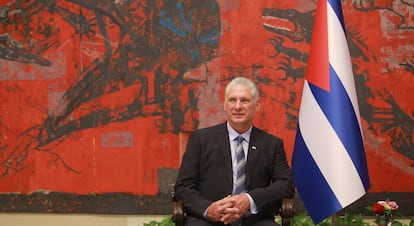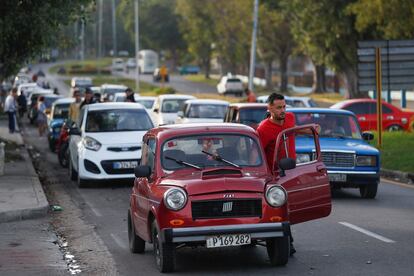Sacking of Cuba’s Economy Minister exposes the country’s state of collapse
The dismissal of Alejandro Gil fuels speculation that the government is seeking scapegoats for drastic price hikes and stagnant reforms

Alejandro Gil was put in charge of Cuba’s economy in 2018, but after a six-year spell in office, his management was defined by unmitigated failure. Every recovery plan he announced crashed, among them the so-called Tarea ordenamiento of 2021, which promised Cubans a better standard of living by bringing the dual currency to an end and revising prices. Instead, the plan resulted in soaring inflation and a deepening crisis that led to the largest migratory exodus in the island’s history.
The dismissal of the Deputy Prime Minister and Minister of Economy and Planning 10 days ago by President Miguel Díaz-Canel exposes a state of general collapse in the country involving a food emergency, the dismantling of almost non-existent strategic sectors such as sugar production, a fiscal deficit 18.5% higher than that of the previous decade and tensions within the government, according to analysts and the former minister’s own sister, María Victoria Gil.
It was precisely the now-exiled María Victoria Gil, a popular Cuban TV presenter and host of the show De la gran escena for 29 years, who described her brother as the “most hated person in Cuba” on account of the unrelenting bad news he delivered. Still, Díaz-Canel publicly wished him happy birthday on February 6 when he turned 60, along with other economists, political leaders, Communist Party members and ministerial cadres. “Another embrace for Alejandro Gil Fernández, on his birthday,” the president wrote on X. It was the second embrace he had sent him within the space of a few days; the first accompanied his dismissal.
Gil was promoted to the post of Economy Minister the same year Díaz-Canel assumed the presidency. Both men hailed from Villa Clara and while Díaz-Canel replaced the octogenarian Raúl Castro, Gil replaced the 82-year-old Ricardo Cabrisas. Not yet 60, both men were part of an image makeover. For the first time, those behind Cuba’s 1959 Revolution were not in possession of the country’s most powerful jobs.
When Gil took office, the Cuban economy was not in great shape, but it was in better shape than it is now. Though they failed to address the economy’s structural problems, the economic reforms undertaken during Raúl Castro’s presidency offered some respite, especially with the introduction of an incipient private sector, the rise of self-employment, and a certain opening up to foreign investment. As relations with the U.S. were resumed, and the island enjoyed weekly visits from celebrities such as Paris Hilton and Beyoncé, the outlook seemed promising. It is not clear what might have happened if Donald Trump had not ditched Obama’s Cuba policy; some believe that Cubans would now be enjoying better economic conditions while others are not convinced the injection of celebrities and turning Old Havana into Karl Lagerfeld’s catwalk would have done the trick. What is certain is that everything that followed has accelerated the impoverishment of the Cuban people.
Economist Pavel Vidal, who worked at the Central Bank of Cuba (BCC), observes that Gil’s promotion coincided with a phase in which many of the reforms undertaken during Raúl Castro’s presidency had already stalled. “Díaz-Canel’s first years in power were quite stagnant,” he says. “He became president during a period with very little momentum regarding structural reforms. There was not much room for action at that time.”
To be replaced by Joaquín Alonso Vázquez, formerly the president of the BCC, Gil is leaving Cubans with a myriad of problems. “The country in 2018 was in a better place than it is now in 2024,” says Omar Everleny Pérez Villanueva, former director of the Cuban Economy Study Center at the University of Havana. “Cuba was receiving almost four million tourists, the purchasing power of the population was greater, there were no difficulties with fuel, the fiscal deficit was 8% with respect to GDP, and the basic food basket was accessible,” he says.
Cuban economist Mauricio de Miranda, professor at the Pontificia Javeriana University in Cali, Colombia, struggles to come up with even one achievement during Gil’s time at the Economy Ministry. “He is probably a good person,” he says. “He is seen as someone who is easy-going. But that is not what it takes to be a minister. His pronouncements frequently exposed his lack of any economic background and an attachment to repeated dogmas. The errors are enough to explain his dismissal, although I am almost certain that he did nothing more than follow the line he was given.”
Meanwhile, Everleny credits Gil for his role in opening up the private sector with the creation of MSMEs — small and medium-sized enterprises that were legally approved in 2021 after decades of being outlawed, although there are still many restrictions imposed upon them by the state. “In his speeches, he defended them to the hilt,” says Everleny. “He was flexible and quick regarding the approval of the MSMEs, with more than 10,000 approved in two years.”
Experts agree that one of the worst economic decisions involving Gil was the so-called Tarea ordenamiento of 2021, which sought to bring Cuba out of economic stagnation by shelving the dual currency, eliminating the convertible peso, and implementing a reform regarding prices, salaries, and pensions. “It also fell to him to deal with the fallout of that failed monetary reform,” Vidal points out. “It was a huge challenge, and I don’t think he handled it well. I think it is a significant failure of the entire economic policy design in Cuba.”
Vidal also believes that Gil was partly responsible for a program of measures “implemented year after year — measures that changed nothing; partial measures that would act as a sticking plaster for certain situations as the efficiency of the socialist state enterprise was insisted upon; thinking that the Cuban model could be improved without drastic change, not making deep reforms but seeking improvements — an approach that has been pursued so many times, but which does not work.”
However, economists do not believe that Gil was significantly worse at running the economy than his predecessors. “I wouldn’t say he was worse than the previous minister regarding his performance, but the situation he found himself in was very tricky,” says Everleny. From 2018 to date, Cuba has been impacted by the heavy-handed policy implemented by the Trump administration, the fallout from the coronavirus pandemic and the consequent drop in tourism — a fundamental sector for the economy. There has also been a decrease in oil imports from Venezuela and Mexico, and an adverse international context due to different conflicts that have affected the world’s economies.
In a country with a highly centralized power system, it is impossible to identify one single culprit for the current economic situation. “Gil is not the only one responsible for the economic situation he is leaving behind,” says Everleny. “In Cuba, power is highly centralized, which means that the main decisions are approved at the highest levels. The power structures are designed so that no one deviates from the party line, and I am not referring to a change in the system, but to changes in the way the economy is run, such as a new role for the market.” Regarding Gil’s possible push for change, Everleny believes that there is no evidence of it. “I am referring to the real changes needed to emerge from stagnation,” he says. “He defended the country’s official position.”
Along with Gil, other officials have also been removed from their posts, such as the Food Industry Minister, Manuel Santiago Sobrino Martínez, and Science Minister Elba Rosa Pérez Montoya. Although no one predicted the sackings, at the start of the year Raúl Castro urged all leaders who were not achieving results to leave their posts: “Those who, due to insufficient capacity, lack of preparation, or simply because they are tired, are not up to the job, must give up their posts to another comrade willing to take on the task,” he said. But the dismissal of Gil in the midst of economic reforms came as a surprise and unleashed a tsunami of speculation: Why now, in the middle of an economic crisis with no end in sight, and not before?

Whitewashing and political infighting
Some say that the government, with Díaz-Canel as president, is trying to whitewash itself in the face of the general dissatisfaction with the raft of measures announced to alleviate the ravages of the economy in the long-term, but that involve a direct blow to the population’s pocket in the here and now, with an increase of more than 500% in the price of gasoline and hikes in electricity, gas, and water. Although these measures were to be implemented on February 1, the government has been forced to kick them down the road. “I believe that it was necessary to sacrifice a pawn from the chess board so that the blame for the economic disaster would fall on the Ministry of Economy and Planning, despite everyone knowing that one man cannot be responsible for the current economic crisis,” says Everleny.
According to Vidal, there are two theories. “They want to be able to wipe the slate clean after so many failures — all the things that have gone wrong with the economy, and all the promises that have not been fulfilled in terms of recovery. Or it may be their strategy to try to have a scapegoat and present a new image, with new ministers and new policies to generate a bit of hope, which I don’t think is working anymore,” he says. “This is a variation on a theme that has been adopted by the Cuban government on previous occasions and is adopted by all governments when things don’t work out.” Vidal also believes that there may be some kind of conflict within the National Assembly of People’s Power where, according to him, there were quarrels last year regarding “the budget data that was being presented and the measures, neither of which were consistent with what had been announced by Prime Minister Manuel Marrero.”
Gil’s sister, María Victoria Gil, told YouTuber Darwin Santana that her brother had significant disagreements within the upper echelons of the government on economic policies. “He has been upset because he has been strongly opposed to a whole series of measures that are going to be implemented in our country and that are increasingly designed to harm Cubans further,” she said.
Gil will no longer be the person who says that there is no milk for the children, that the basic food basket “is a distortion that we have to correct,” that “the economy is in a complex situation,” and that the country does not have the money from exports to buy in food from abroad; nor will he be the person who asks the people to continue having confidence in the revolution and socialism straight after delivering bad news.
Maria Victoria Gil has said that she learned from her sister-in-law that Gil is “disappointed” by his dismissal. “It is common knowledge that the Cuban government, throughout its sad history, has used its leaders for its own convenience and when they are no longer useful to them, when these leaders confront them and cease to be their puppets, they get rid of them and malign them,” she wrote on Facebook. “The only thing my brother has done has been to work tirelessly, trying to salvage the unsalvageable.”
Sign up for our weekly newsletter to get more English-language news coverage from EL PAÍS USA Edition
Tu suscripción se está usando en otro dispositivo
¿Quieres añadir otro usuario a tu suscripción?
Si continúas leyendo en este dispositivo, no se podrá leer en el otro.
FlechaTu suscripción se está usando en otro dispositivo y solo puedes acceder a EL PAÍS desde un dispositivo a la vez.
Si quieres compartir tu cuenta, cambia tu suscripción a la modalidad Premium, así podrás añadir otro usuario. Cada uno accederá con su propia cuenta de email, lo que os permitirá personalizar vuestra experiencia en EL PAÍS.
¿Tienes una suscripción de empresa? Accede aquí para contratar más cuentas.
En el caso de no saber quién está usando tu cuenta, te recomendamos cambiar tu contraseña aquí.
Si decides continuar compartiendo tu cuenta, este mensaje se mostrará en tu dispositivo y en el de la otra persona que está usando tu cuenta de forma indefinida, afectando a tu experiencia de lectura. Puedes consultar aquí los términos y condiciones de la suscripción digital.









































